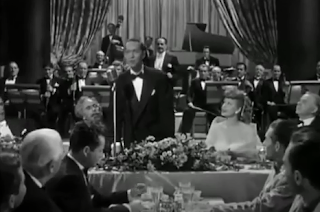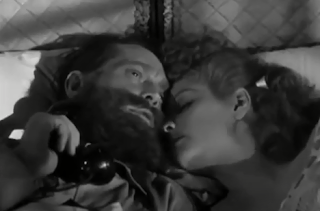 |
| Her Husband's Affairs. Source: my collection |
1947 was Franchot's year for marriage-related comedies. He starred in Lost Honeymoon with Ann Richards and Tom Conway, Honeymoon with Shirley Temple and Guy Madison, and Her Husband's Affairs with Lucille Ball. Her Husband's Affairs was directed by S. Sylvan Simon, who would direct Franchot again in the film noir I Love Trouble the following year.
In Her Husband's Affairs, Franchot plays Bill Weldon, an advertising man looking for his big shot at wealth and fame by latching on to the hare-brained schemes of inventor Emil Glinka (Mikhail Rasumny). Bill is clever and creative, but his wife Margaret (Lucille Ball) is the real innovative problem solver in the marriage—a fact that irks Bill and causes a great deal of marital tension throughout the film, which is currently available to watch on Youtube.
 |
| Franchot, Lucy, and director S. Sylvan Simon clown around in this on set candid. Source: my collection |
The comedy received mixed reviews when it was released in the fall of 1947. Bosley Crowthers, New York Times reviewer and never a big Franchot fan, called the movie a "featherweight farce" and wrote:
To try to make any sense of it would be the most arrant foolishness, for it plainly was not intended to follow a coherent line. It is simply a lot of nonsense about a husband, his buttinsky wife and a thoroughly eccentric inventor...Except for occasional incidents which are good for explosive yaks—and in most of which, significantly, Mikhail Rasumny is involved—the humor is pretty labored, the going pretty rough. Lucille Ball, an able comedienne, works hard and adroitly as the wife, and Franchot Tone springs about as the husband, but they labor to little avail.
Independent Exhibitors reviewers gave the film a mere two stars and called it "an insult to audience's intelligence" and said it was "based on a premise that might have been considered funny in the days of silent two-reel comedies." But The Film Daily disagreed. Film Daily praised the film:
The "near-censorable situations" that Film Daily refer to are many sweet, cuddling scenes in the Weldons' bed—definitely occurring more frequently than in other films of its time, and Franchot and Lucy look and act fabulous together. However, as forward as these scenes may seem in retrospect, the premise of the film—concerning a man jealous of his wife's creative ideas and not wanting her opinions, only her approval—is certainly of its time. Let's just say that the character Bill Weldon will never be upheld as an early feminist.Tone and Ball have a field day in this wild and merry farce which rates plugging by wise exhibitors. This is one of the wildest, merriest farces to come to the screen in many moons. In addition to its laugh-provoking zany capers, it has a love story, with one or two near-censorable situations. In all, it adds up to an attraction that deserves plugging by wise exhibitors.
Bill (Tone) comes up with advertising ideas in the middle of the night, looking for the next big craze. He tells Margaret (Ball) that he is sick and tired of hats being sold for their durability, because what men require is a lightweight hat. As he weighs and tries on the hat and fires off possible slogans, Margaret responds with great feedback and suggestions for improvement. Bill replies:
Bill's so preoccupied with his work that he's postponed their honeymoon cruise to Bermuda four—soon to be five—times! With his latest lightweight hat notion, Bill knows he must stage a stunt for publicity. He aims to convince the mayor to wear the hat at the ball game and have a cameraman ready for the perfect shot. But the mayor refuses and without consulting her husband, Margaret decides to place the hat on the mayor's head during the national anthem. People grow angry with the mayor for keeping a hat on during the anthem and he responds, "I didn't know I was wearing one," exactly as Bill wanted, and all thanks to Margaret's quick thinking.I love you very much, but these are my slogans. Let's not collaborate...Learn to respect my ability. I don't need any creative help from you, just your approval.
 |
| Film still. Source: my collection. |
He’s really a brilliant man, Mr. Brewster, but like so many brilliant men he just runs off the track. He gets hold of an idea and it gets bigger than he is. I know he’s working on something very brilliant right now but, you see, when a man’s a genius you can’t trust him…
 |
| Film still. Source: my collection. |























No comments:
Post a Comment